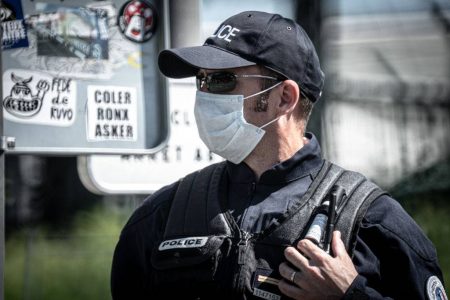
Terrorism in the era of coronavirus
French counterterrorism police are investigating a stabbing attack in southeast France in which two people were killed and five injured. The attack was a reminder that while the media focus is mainly on Covid-19, terrorism remains an enduring threat.
While Islamic State and al-Qaeda recognise that the Covid-19 pandemic is a danger to their followers, they also see it as an opportunity to win over more supporters and strike their Western enemies while they are weakened and distracted.
In its al-Naba newsletter on 19 March, Islamic State announced a new strategic plan under the title ‘Crusaders’ biggest nightmare’ urging lone actors to capitalise on the paralysis and fear overtaking ‘crusader’ countries amid the pandemic, to show no mercy and to launch attacks in this time of crisis.
Both organisations have observed that arch-enemy America is being punished by Allah for its actions against Muslims. In recent propaganda communiqués, Islamic State and al-Qaeda have both claimed that the coronavirus is Allah’s wrath upon the West, and the virus is a ‘soldier of Allah’.
Al-Qaeda was no doubt pleased to learn that Judge Kevin Duffy, who presided over three major New York terrorism trials in the 1990s, has been killed by the coronavirus.
The ‘Allah’s revenge’ narrative has been reinforced by the relatively small number of victims so far in regions where Islamist extremist groups are well established—such as in Afghanistan, Pakistan, the Arabian Peninsula, and the Sahel region of northern Africa.
Al-Qaeda lauded the economic impact of Covid-19 in bringing America’s surging economy to an abrupt halt—leading to the filing of millions of unemployment claims and a $2 trillion bailout package. Bleeding the American economy was always an aim of al-Qaeda; the financial cost of 9/11 and its aftermath was something Osama Bin Laden cited as one of his great successes.
Meanwhile, the International Crisis Group warned that the pandemic threatens global solidarity in fighting extremists—‘allowing the jihadists to better prepare spectacular terror attacks’.
But it’s not only Sunni extremists that pose an existential terrorism threat to the West. The extreme right also sees it as an opportunity to advance its agendas.
Joshua Fisher-Birch, a researcher for the Counter Extremism Project, says that groups like the ‘Nordic Resistance’ and ‘Hundred Handers’ have sought to increase their membership by capitalising on the pandemic, and ‘Generation Identity’ has used the crisis to promote European ethno-nationalism.
British anti-extremist group ‘Hope Not Hate’ claims that far-right extremist groups are seeking to use the pandemic to drive recruitment, spread racist propaganda and plan attacks. According to Fisher-Birch, ‘These groups understand that a pandemic and economic downturn provide them with opportunities to promote conspiracy theories, assign blame and offer their ideology as a solution.’
Having a ‘captive’ audience in lockdown in many Western countries has provided both Islamist and extreme right-wing groups with new online opportunities to contact potential members through a variety of social platforms. A particular target is young people who are now learning online and are more accessible than they would be if they were in school.
Al-Qaeda suggested on 1 April that non-Muslims in the West should use their quarantine (self-isolation) time to study and embrace Islam.
Extreme right-wing groups in Australia are well positioned to use fake news to drive a wedge between ethnic communities, such as by demonising Asians for spreading the Covid-19 virus from China.
Crowds are no longer an available target for Islamist extremists in Australia due to social-distancing and self-isolation measures, but the kinds of low-tech, high-impact attacks that Islamic State favours—vehicle rammings and knife attacks—are still a practical option for terrorists.
In addition, an extremist infected with Covid-19 could use it as a weapon to deliberately infect target groups. Far-right extremists are encouraging each other to seize the moment online, using platforms like Telegram to discuss how to purposely infect members of minority groups.
The most recent terrorism-related incident in Australia was the arrest in March of a 21-year-old with neo-Nazi interests from Sanctuary Point in New South Wales. He was allegedly planning to disrupt an electrical substation and obtain material to construct an explosive device. A second man was later also charged.
While that alleged plot was interdicted at an early stage, police in all states and territories are now distracted and weakened by Covid-19-related policing demands. This could allow extremist community-based activities that would normally attract police attention to go undetected—such as early indications of preparation for an attack.
This in turn will put more pressure on Australia’s intelligence agencies, which are probably also operating under resource constraints due to Covid-19.
Source: ASPI





